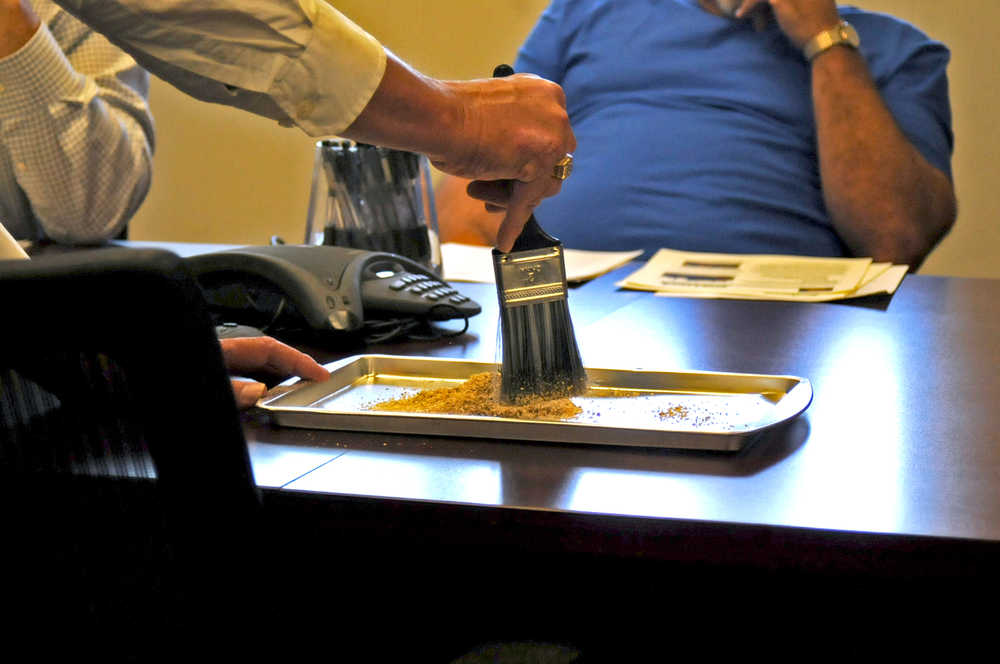When an oil spill occurs, one of the first reactions is to use something to mop it up.
Respondents will use clay-based absorbents on land-based spills or polymer dispersants on water to help dissipate or collect the oil so it’s easier to remove from the spill site. However, it can be expensive and may take significant volumes before the spill is under control.
David Schmitt, the COO of Spring Hope, North Carolina-based Industrial Hemp Manufacturing, thinks there’s a better way. His company produces a plant fiber-based absorbent called SpillSuck he said was used to combat the 2010 Deepwater Horizon oil spill in the Gulf of Mexico.
Despite the company’s name, the farm has just started growing hemp. Most of its past products have been made of kenaf, a widely legal cousin. The kenaf plant is a member of the hibiscus family, making it more closely related to the state flower of Hawaii than the hemp plant, which is in the cannabis family.
“Kenaf is legal everywhere,” Schmitt said during a presentation at the Kenai Peninsula Economic Development District on Aug. 16. “It looks like the marijuana plant … but it causes severe headaches and tears (smokers’) throats all up.”
Ground kenaf looks like sawdust. The enzymes in the plant eat hydrocarbons, so the fibers suck up oil rapidly and can be swept away after a few minutes, Schmitt explained. To demonstrate, he poured motor oil in a pan and topped it with a generous handful of the kenaf. He worked it in with a paintbrush, and after a moment, swept it clean into a corner, all the oil absorbed.
“This stuff will absorb 30 times more than clay,” Schmitt said. “… You pour some motor oil down and you put clay on it, and more clay and more clay, and you still have a very heavy film on the concrete floor. You put a fourth as much of our kenaf material, it’ll clean the same amount of oil up and then it’ll finish cleaning up the area that the clay didn’t clean up.”
Kenaf is more expensive than the clay composites used to absorb oil in land-based spills and the polymers used in water-based spills but is more absorbent, balancing out. Because it contains no THC, it is legal everywhere in the world, and is used for a variety of purposes from pet bedding to paper.
Schmitt’s company is in its second growing season for kenaf. However, this year he also planted a hemp crop as part of a pilot project after North Carolina legalized the plant for some producers to grow through a pilot project, authorized by the 2014 national farm bill. Though kenaf is a useful plant, hemp has more potential products, he said.
“What the whole hemp movement is about is job creation and economic development,” Schmitt said. “There’s over 25,000 uses for the industrial hemp plant. My focus is on products to help the environment … in the short term, in the next year or two, I’d love to sell our products (in Alaska). But ultimately, to be cost effective and to be competitive, it’s going to have to happen right here.”
Though commercial marijuana became legal in Alaska in February 2015, hemp is not yet legal. The marijuana relative has lower concentrations of THC, the psychoactive chemical in marijuana, and produces woody fiber that is used in textiles and construction. A bill had been floating through the Legislature since January 2015 to legalize industrial hemp but was not passed during the last session.
Jack Bennett of Homer said he sees great potential for hemp in the state beyond. He’s currently building a house out of hemp on East End Road, importing the wood from overseas through Seattle to build it. Alaska’s agriculture industry could benefit greatly from the legalization of hemp, he said.
Hemp homes have been built all over the world and are more energy efficient at preserving heat, he said. That could be a huge boon to Alaska, where heat is one of the single largest bills for homeowners. Plus, hemp is like any other woody fiber, he said.
“They don’t have to look hippie or alternative to be comfortable,” Bennett said.
Bennett is using hempcrete, a product using the interior fibers of the hemp plant mixed with lime and water to use as insulation. The savings could help offset the cost of housing in rural Alaska, where more low-income Alaskans tend to live, he said.
Bennett has given presentations at the Homer Rotary Club, the Kenai Peninsula Economic Development District, Homer City Council and has plans to present before the Kenai Peninsula Borough Assembly. He said he was able to talk with Gov. Bill Walker about legal hemp in Alaska as well.
Besides the construction and oil industry applications, hemp has a number of value-added product uses, from car parts to hair products, that would make it a viable agricultural product in Alaska, he said. Some people have been receptive to it, while others have been wary, he said.
“I run into people who are totally for it and others who are totally opposed to it,” Bennett said. “That’s sort of discouraging, but you know, you kind of expect that.”
Reach Elizabeth Earl at elizabeth.earl@peninsulaclarion.com.

